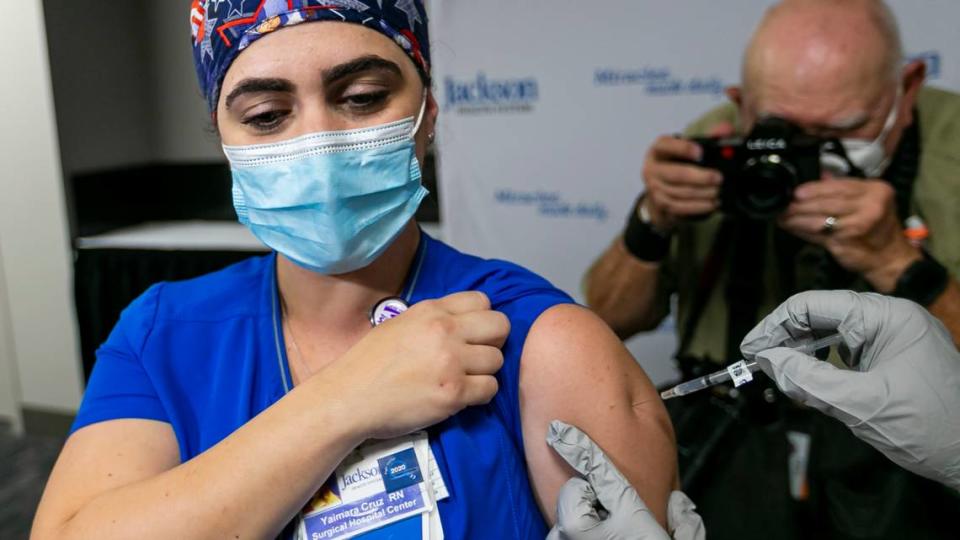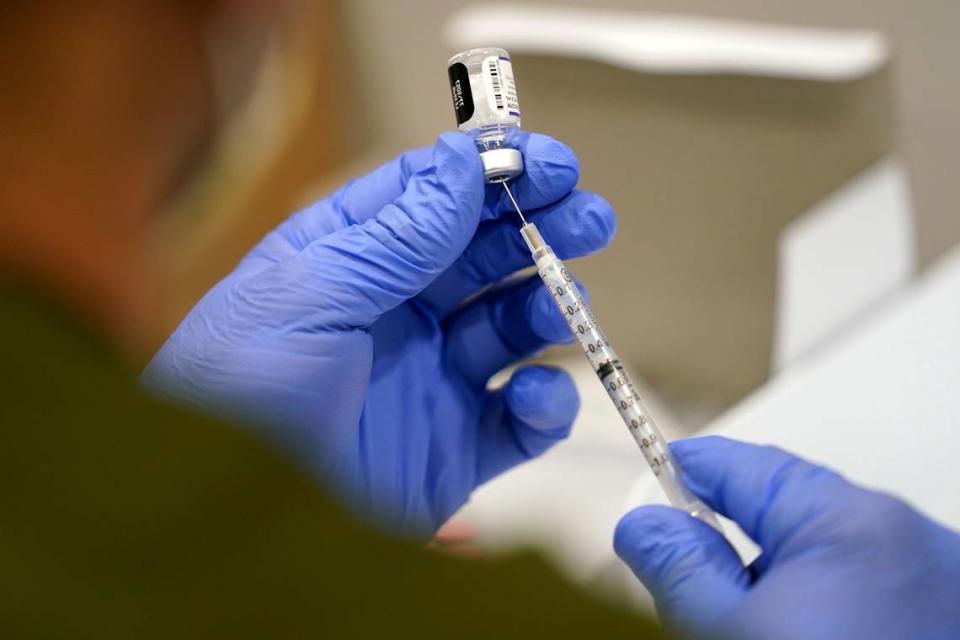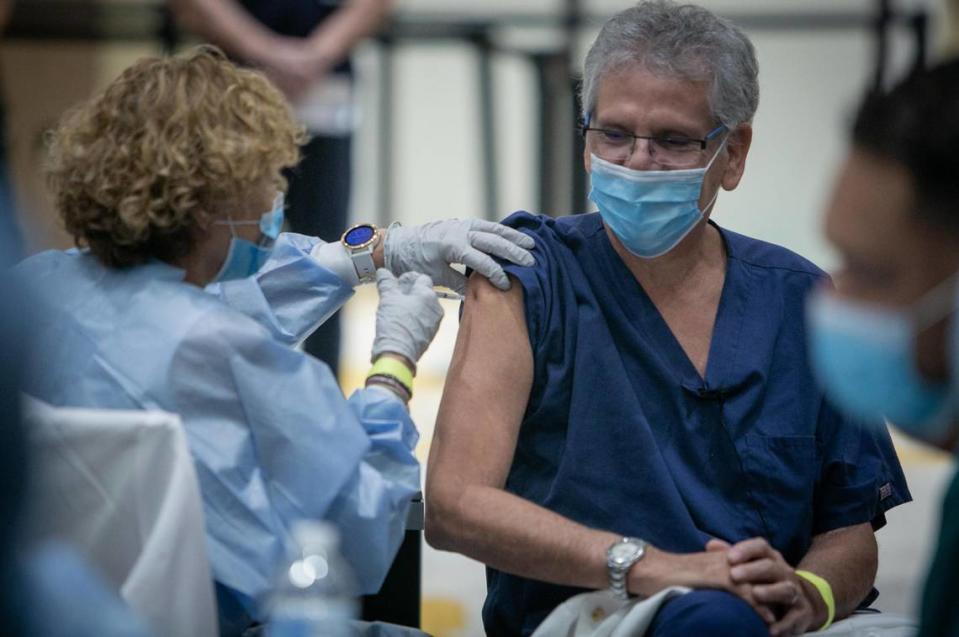Florida hospitals trying for 100 percent COVID vaccine rates for workers as mandate looms
After months of paying bonuses to persuade employees to get vaccinated or hitting them with extra training and penalties if they didn’t, Florida hospital leaders say their institutions are well on the way to complying with a federal mandate to inoculate their workers against COVID-19.
As of Monday, hospitals were required to have all workers fully vaccinated or to grant them an approved exemption, though federal regulators are giving facilities more time to comply with the mandate without being penalized — as long as they have achieved at least a 90% compliance rate.
Hospitals are not required to report staff vaccination rates to federal regulators until May, when they will be publicized through the Centers for Disease Control and Prevention. After the March 30 deadline for hospitals to vaccinate or grant an exemption to 100% of their staff, compliance will be enforced through federal and state surveyors and by accrediting organizations.
In South Florida, the hospitals with the most employees have reported staff vaccination rates of 90% or higher, many as the result of aggressive campaigns launched during the state’s summer delta wave and reinforced after the Supreme Court upheld the Biden administration’s vaccine mandate for healthcare workers in January.
“We’re really happy with our progress. At this point, we are 95% compliant,” said Julie Staub, vice president and chief human resources officer for Miami-Dade’s public hospital, Jackson Health System, which has about 13,000 full-time employees.

Staub said more than 90% of Jackson Health workers are fully vaccinated and about 5% have a religious or medical exemption.
The challenge now, she said, will be persuading the remaining unvaccinated employees to take the shots.
“We have to get them over the finish line,” Staub said.
Reaching the remaining unvaccinated
Jackson Health had charged unvaccinated workers higher premiums for their health insurance, required them to wear N-95 respirator masks at all times while indoors, and barred them from entering employee dining areas. The campaign has worked — Jackson’s employee vaccine rate was around 60 percent in August.
Hospital administrators will continue to reach out to unvaccinated employees, however those who do not comply by March 30 “are subject to disciplinary action and would not be eligible to work on site,” Staub said.
Two years into the pandemic, and with the hospital industry struggling to fill a shortage of nurses, technicians and other workers, Staub said Jackson Health doesn’t want to fire anybody over the vaccine mandate.
Before it gets to that, Staub said Jackson Health may consider transferring an unvaccinated employee to a different job that is 100% remote and does not require that person to be at a hospital, assuming there’s an opening. She said about 400 to 500 employees meet that designation and are not required to be vaccinated.
After offering financial bonuses for those who took the shots, and imposing mask-wearing rules on those who refused, hospitals may have only the threat of termination left to persuade any holdouts.
The deadline is March 30 for hospitals to achieve 100% compliance with the federal regulations from the Centers for Medicare and Medicaid Services (CMS) or risk enforcement actions.

Hospitals that do not comply with the federal mandate risk termination from the Medicare and Medicaid programs, the biggest payers in the U.S. healthcare system and the financial lifeblood of most medical facilities.
But in the vast majority of cases, termination from the public health insurance programs will not occur until a hospital has been afforded time to comply and after all other remedies are exhausted, said Mary Mayhew, president of the Florida Hospital Association, an industry lobbying group.
“It’s a very lengthy process,” Mayhew said of federal regulators terminating a hospital from Medicare and Medicaid. “Hospitals have an opportunity not only to submit corrective action plans, but to appeal through administrative processes and then ultimately to pursue legal action in the courts.”
Incentives helped; mandates did better
In South Florida, hospitals have used a carrot-and-stick approach to persuade employees to get vaccinated, with some offering bonuses for those unvaccinated employees who took the shots and others imposing mask-wearing rules, financial penalties or additional training for those who refused.
And though the region’s largest hospitals were reporting staff vaccination rates of 80% or higher in November, the few medical centers that had adopted a vaccine mandate for employees reported even higher coverage rates of 90% or more of their employees inoculated.
Baptist Health South Florida, the largest nonprofit hospital system in the region with 11 medical centers in Monroe, Miami-Dade and Palm Beach counties, announced a vaccine mandate for its more than 24,000 employees in August.
But Baptist Health paused the policy in November while states, including Florida, challenged the federal government’s mandate in court and Florida’s Legislature and Gov. Ron DeSantis ratified a legal ban on employer vaccine mandates.
Florida has since dropped its legal challenge to the federal mandate, and healthcare providers say they intend to comply with the federal requirements after the Supreme Court ruling.

Before pausing the mandate, Baptist Health reported a 99% compliance rate in November, including 94% vaccinated and about 5% exempted for a religious or medical reason.
Baptist Health did not respond to the Herald’s interview request, but a spokeswoman said in an email that the hospital system is abiding by the federal mandate.
“We continue to work toward confirming and maintaining 100% compliance with the rule,” said Dori Alvarez, a spokeswoman.
Nicklaus Children’s Hospital in Miami also announced a vaccine mandate for employees in August but appeared to back off the policy when states challenged the federal policy in court. In November, Nicklaus Children’s had reported that 98% of about 4,000 workers were in compliance with the hospital’s vaccine policy, but administrators declined to say how many had exemptions.
Nicklaus Children’s did not respond to the Herald’s interview request, but a spokeswoman said in an email that the hospital is committed to complying with the federal mandate.
“The hospital is poised to fulfill the vaccine requirement recently upheld by the Supreme Court,” said Rachel Bixby, a spokeswoman.
Holy Cross Health in Fort Lauderdale was one of the first hospital systems in South Florida to impose a vaccine mandate for employees in July. The hospital system’s worker vaccination rate was about 60% at the time, but Holy Cross, which did not respond to the Herald’s interview requests, reported that 96% of its nearly 3,000 employees were in compliance by November.
Memorial Healthcare System, the public hospital for South Broward, did not make anyone available for an interview. The hospital system has about 14,000 employees, and as of January administrators had reported about 90% of staff were vaccinated.

